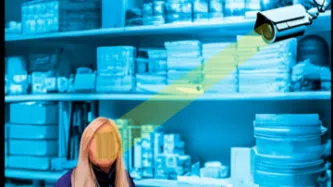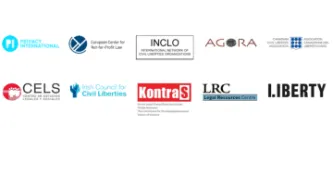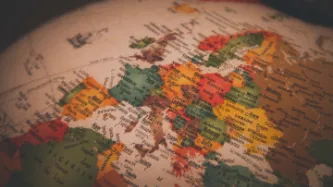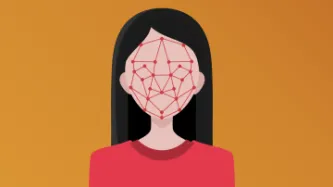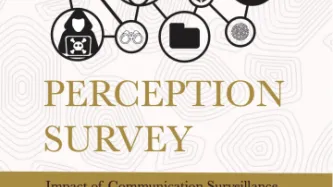Search
Content type: Advocacy
Generative AI models are based on indiscriminate and potentially harmful data scrapingExisting and emergent practices of web-scraping for AI is rife with problems. We are not convinced it stands up to the scrutiny and standards expected by existing law. If the balance is got wrong here, then people stand to have their right to privacy further violated by new technologies.The approach taken by the ICO towards web scraping for generative AI models may therefore have important downstream…
Content type: Press release
9 November 2023 - Privacy International (PI) has just published new research into UK Members of Parliament’s (startling lack of) knowledge on the use of Facial Recognition Technology (FRT) in public spaces, even within their own constituencies. Read the research published here in full: "MPs Asleep at the Wheel as Facial Recognition Technology Spells The End of Privacy in Public".PI has recently conducted a survey of 114 UK MPs through YouGov. Published this morning, the results are seriously…
Content type: Advocacy
Privacy International (PI), the European Center for Not-for-Profit Law (ECNL), International Network of Civil Liberties Organizations (INCLO), Agora, the Canadian Civil Liberties Association, Centro de Estudios Legales y Sociales in Argentina, the Irish Council for Civil Liberties, KontraS in Indonesia, the Legal Resources Center in South Africa, and Liberty in the UK welcome the opportunity to provide input to the global study of the UN Special Rapporteur on the promotion and protection of…
Content type: Advocacy
We, the undersigned organisations, seek to draw your attention to aspects of the draft Corporate Sustainability Due Diligence Directive (the Directive), and its application to the use of technology and the technology sector, which require strengthening if the Directive is to realise its full potential in respect of this critical global sector that is today responsible for some of the most egregious human rights harms.
The technology and surveillance industries have ushered in an entirely new…
Content type: Examples
Emails obtained by EFF show that the Los Angeles Police Department contacted Amazon Ring owners specifically asking for footage of protests against racist police violence that took place across the US in the summer of 2020. LAPD signed a formal partnership with Ring and its associated "Neighbors" app in May 2019. Requests for Ring footage typically include the name of the detective, a description of the incident under investigation, and a time period. If enough people in a neighbourhood…
Content type: Report
This briefing takes a look at the private intelligence industry, a collection of private detectives, corporate intel firms, and PR agencies working for clients around the world that have made London their hub.
Often staffed by ex-spooks, and promising complete secrecy, little is known about them. But reports over the years have exposed their operations, including things like hacking and targeting of anti-corruption officials, spying on peaceful environment activists, and running fake '…
Content type: Video
Links
The Enablers by the Bureau of Investigative Journalism
PI's report
Submit your podcast questions
Sign up to our mailing list
Places to listen
You can listen and subscribe to the podcast where ever you normally find your podcasts:
Spotify | Apple podcasts | Castbox | Google podcasts | Overcast | Stitcher | Pocket Casts | Peertube | Youtube | Soundcloud | Podbean | Podcast Republic | Breaker | Podcast Addict | Deezer | and more...
Content type: Explainer
Following sustained reporting by researchers, journalists and activists around the world, including recent disclosures exposed by the PegasusProject, the surveillance industry is facing scrutiny like never before.
In the latest move, eighteen U.S. lawmakers have today demanded that the U.S. government imposes sanctions on four non-US surveillance companies for, as they mention in their letter, facilitating “disappearance, torture and murder of human rights activists and journalists”.
The move…
Content type: Video
<br />
Links
Read more about the ICO's provisional decision
Support our work
You can find out more about Clearview by listening to our podcast: The end of privacy? The spread of facial recognition
Content type: Long Read
Zimbabwe has a history of state led surveillance that is carried out more for political gain than for the investigation of legitimate criminal activities. During former President Mugabe’s 37 year rule the government used laws and state security structures to carry out targeted surveillance of persons of political interest and more generalised mass surveillance of the population.
Specific laws such as the Interception of Communications Act as well as mandatory SIM-card registration regulations…
Content type: News & Analysis
As Amnesty International and Forbidden Stories continue to publish crucial information about the potential targets of NSO Group’s spyware, we know this much already: something needs to be done.
But what exactly needs to be done is less obvious. Even though this is not the first time that the world has learned about major abuses by the surveillance industry (indeed, it’s not even the first time this month), it’s difficult to know what needs to change.
So how can the proliferation and use of…
Content type: Press release
Amnesty International, Privacy International and The Centre for Research on Multinational Corporations (SOMO) have published a report uncovering NSO Group’s entire corporate structure, tracking the global money trail of both public and private investment into the lucrative spyware company.
Amnesty International and other rights groups have documented dozens of cases of NSO Group’s products being used by repressive governments across the world to put activists, journalists, and opposition…
Content type: Report
In this briefing, Amnesty International, PI and The Centre for Research on Multinational Corporations (SOMO) discuss the corporate structure of NSO group, one of the surveillance industry's well-known participants. The lack of transparency around NSO Group’s corporate structure and the lack of information about the relevant jurisdictions within which it operates are significant barriers in seeking prevention of, and accountability for, human rights violations reportedly linked to NSO Group’s…
Content type: Report
Human rights defenders across the world have been facing increasing threats and harms as result of the use of digital and technological tools used by governments and companies which enable the surveillance, monitoring and tracking of individuals and communities. They are continuously at risk of violence, intimidation and surveillance as a direct consequence of the work they do. Such surveillance has been shown to lead to arbitrary detention, sometimes to torture and possibly to extrajudicial…
Content type: Examples
Sidestepping the need to obtain a search warrant, the US Department of Homeland Security (DHS) has been accessing smartphone location data by buying it from private marketing that typically embed tracker in apps. This data, which maps the movement of millions of cellphones in America, was collected from ordinary cellphone apps, to which users gave access to their location. In this particular instance, it was used by the DHS to search for undocumented immigrants according to the Wall Street…
Content type: Report
Privacy International has released a report summarising the result of its research into the databases and surveillance tools used by authorities across the UK’s borders, immigration, and citizenship system.
The report uses procurement, contractual, and other open-source data and aims to inform the work of civil society organisations and increase understanding of a vast yet highly opaque system upon which millions of people rely.
It also describes and maps…
Content type: News & Analysis
An excerpt of this piece was first published in June 2020 in Adbusters, an international not-for-profit magazine produced by a global collective of artists and activists who want to 'shake up complacent consumer culture'.
Big oil. Big tobacco. Big pharma. How did we let ‘big tech’ happen? You would have thought humanity would learn its lesson. That nothing good comes of the mass accumulation and concentration of power into the hands of so few.
The internet was meant to be different. No…
Content type: News & Analysis
A new report by the UN Working Group on mercenaries analyses the impact of the use of private military and security services in immigration and border management on the rights of migrants, and highlights the responsibilities of private actors in human rights abuses as well as lack of oversight and, ultimately, of accountability of the system.
Governments worldwide have prioritised an approach to immigration that criminalises the act of migration and focuses on security.
Today, borders are not…
Content type: Explainer
At first glance, infrared temperature checks would appear to provide much-needed reassurance for people concerned about their own health, as well as that of loved ones and colleagues, as the lockdown is lifted. More people are beginning to travel, and are re-entering offices, airports, and other contained public and private spaces. Thermal imaging cameras are presented as an effective way to detect if someone has one of the symptoms of the coronavirus - a temperature.
However, there is little…
Content type: Long Read
What Do We Know?
Palantir & the NHS
What You Don’t Know About Palantir in the UK
Steps We’re Taking
The Way Forward
This article was written by No Tech For Tyrants - an organisation that works on severing links between higher education, violent tech & hostile immigration environments.
Content type: Case Study
Well into the 21st century, Serbia still does not have a strong privacy culture, which has been left in the shadows of past regimes and widespread surveillance. Even today, direct police and security agencies’ access to communications metadata stored by mobile and internet operators makes mass surveillance possible.
However, a new threat to human rights and freedoms in Serbia has emerged. In early 2019, the Minister of Interior and the Police Director announced that Belgrade will receive “a…
Content type: Advocacy
Privacy International (PI), Fundaciòn Datos Protegidos, Red en Defensa de los Derechos Digitales (R3D) and Statewatch responded to the call for submission of the UN Special Rapporteur on contemporary forms of racism, xenophobia and related intolerance on how digital technologies deployed in the context of border enforcement and administration reproduce, reinforce, and compound racial discrimination.
This submission provides information on specific digital technologies in service of border…
Content type: News & Analysis
Yesterday, Amazon announced that they will be putting a one-year suspension on sales of its facial recognition software Rekognition to law enforcement. While Amazon’s move should be welcomed as a step towards sanctioning company opportunism at the expense of our fundamental freedoms, there is still a lot to be done.
The announcement speaks of just a one-year ban. What is Amazon exactly expecting to change within that one year? Is one year enough to make the technology to not discriminate…
Content type: Case Study
As working from home is becoming the new normal, employees’ monitoring becomes the new norm.
Companies around the globe are increasingly using software to monitor how long we spend in front of our computer, what websites we visit and what apps we use, when we type, for how long and how fast, how long our mouse stay inactive — any more than 15 seconds away can shift us from ‘active’ to ‘idle’ — and require us to keep our camera and microphone on at all times. These systems pit us against our…
Content type: Examples
Amazon has spent $10 million to buy 1,500 cameras to take the temperature of workers from the Chinese firm Zhejiang Dahua Technology Company even though the US previously blacklisted Dahua because it was alleged to have helped China detain and monitor the Uighurs and other Muslim minorities.
The cameras work by comparing a person’s radiation with a separate infrared calibration device and uses face detection technology to make sure it is looking for heat in the right part of the subjects…
Content type: Explainer
In a scramble to track, and thereby stem the flow of, new cases of COVID-19, governments around the world are rushing to track the locations of their populace.
In this third installment of our Covid-19 tracking technology primers, we look at Satellite Navigation technology. In Part 1 of our mini-series on we discussed apps that use Bluetooth for proximity tracking. Telecommunications operators ('telcos'), which we discussed in Part 2, are also handing over customer data, showing the cell towers…
Content type: Examples
Palantir and the British AI start-up Faculty are data-mining large volumes of confidential UK patient information to consolidate government databases and build predictive computer models under contract to NHSx, the digital transformation arm of the UK's National Health Service. NHSx said the goal is to give ministers and officials real-time information to show where demand is rising and equipment needs to be deployed, and that the companies involved do not control the data and are not allowed…
Content type: Examples
As inmates are released from prison in order to mitigate the public health and humanitarian threat posed by the coronavirus poses to a confined population, Minneapolis-based Precision Kiosk Technologies is highlighting its AB Kiosks, which can be used to replace riskier face-to-face meetings with electronic check-ins for newly-released inmates and those on probation, who can use the kiosks to set schedules and trigger reminder texts and emails. The kiosks use fingerprint recognition to verify…
Content type: Examples
The surveillance tool supplier Cy4Gate is pitching surveillance tools to track every citizen and their contacts to multiple governments around the world, including their own. In a demonstration of the system, Governments using the system, which Cy4Gate calls "Human Interaction Tracking System (HITS), would track mobile phone users' location via GPS, cellphone tower data, and Bluetooth. Cy4Gateis ready to offer the system for free to Italian authorities, and pitched it publicly on Twitter in…

